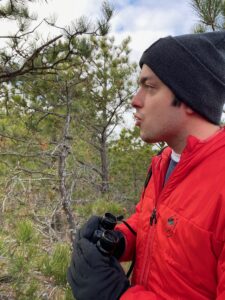Some days, birds just aren’t cooperative. Warblers stick to the crowns of trees, sparrows hide in the bushes, and finches won’t leave the hedges. Birds can be skulky beasts sometimes.
And on those days, nothing beats a good pish.
Pishing, or spishing, as some people call it, is a technique used to attract birds by making noises that are not exactly calls. The basic pish is like a sputtering shush: make one long, forceful shhhhhhhhhh while quickly snapping your lips closed about twice per second to make a sound like pshhhpshhhpshhhpshh. You now know how to pish.

Position yourself in front of some dense brush and start pishing, and if you’re lucky, birds will materialize before your eyes. When it works, pishing can turn a slow birding day into an exciting one.
I’ve stood in front of a seemingly dead thicket and started pishing, only to have an armada of birds pour out, teeing up on nearby branches and sticking their heads out of the dense brush. Chickadees respond to this sound the best, but other birds will respond too — sparrows, vireos, warblers, kinglets, nuthatches. Pish, and they will come.
Most sources agree that birds respond to pishing because the sound triggers their mobbing behavior. When small forest birds, chickadees in particular, spot a predator like an owl or hawk, they begin making harsh, scolding calls at it. These vocalizations, in turn, draw more birds, until the forest is filled with the din of tiny songbirds screaming at the predator.
For chickadees, this scolding call is so important that it gives them their name. The “chick-a-dee-dee” call alerts other birds to danger. They can vary the length of their calls, too, and the more “dees” they tack on to the end, the more dangerous the threat.
It might seem counterintuitive for birds to make their presence known to a raptor, but announcing that they have spotted their predator and are willing to provoke it makes stealth attacks impossible and encourages the raptor to move on to a place with easier, weaker prey.
Accordingly, the more birds that are mobbing a predator, the more likely that predator is to leave the scene. So, birds are attracted to other birds’ scolding calls, coming to join in the mob.
Pishing doesn’t exactly mimic the birds’ scolding sounds, but the pishes seem to trigger the same part of the birds’ brains as hearing those calls does. They seem to come to see what all the fuss is about.
Sometimes all that happens is the birds pop out of hiding, realize that nothing is amiss, and flit back into their bushes. When it works best, though, pishing can get other birds scolding, too. This can go on until there is a veritable pish-fueled frenzy in front of you. Eventually, though, the birds will realize everything is fine and disperse. In these situations, it’s best to stop pishing quickly; you don’t want to agitate the birds too much.
But being successful at pishing requires two things: technique and target.
The simple pshhhh noises are just the basics. I like to interject little sht-sht-sht and ch-ch-ch-ch-chhhhhh sounds. More talented birders can make squeaking sounds by tightly kissing the back of their hands, and one friend of mine will even mimic the call of an eastern screech-owl, a common predator for these songbirds, causing them to fly into a rage of scolding calls.
Not all birds respond well to pishing. Try it in front of a flock of gulls or ducks and they will most likely fly away after looking at you quizzically. Birds that live in dense habitats like forests, scrubby fields, and marshes will respond best.
If you find a spot where there are already a few birds calling, too, that’s probably a good place to pish. If you can get a handful of birds to respond with their own scold calls, they will attract far more birds than pishing alone ever could.
Time of year matters, too. In the spring and summer, birds are a bit more standoffish and focused on getting to their breeding grounds, attracting a mate, and raising young. In the fall and winter, though, birds spend more time in flocks as they meander around looking for food. That’s why it’s easier to draw them in with pishing now.
Pishing is probably best done alone. Most birders know the embarrassment that comes with pishing when you think you’re alone and being interrupted by a confused hiker coming around the corner. Is it best to keep pishing? Stop sheepishly? There is no good answer.
If you’re with friends, though, a little well-placed pishing can make you appear to have superpowers.



